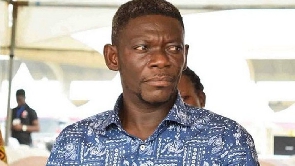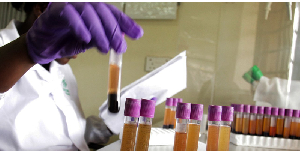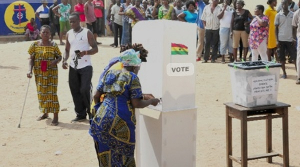- Home - News
- TWI News | TV
- Polls
- Year In Review
- News Archive
- Crime & Punishment
- Politics
- Regional
- Editorial
- Health
- Ghanaians Abroad
- Tabloid
- Africa
- Religion
- Election 2020
- Coronavirus
- News Videos | TV
- Photo Archives
- News Headlines
- Press Release
General News of Thursday, 21 August 1997
Source: --
Water Level Low In Volta Dam, Power cuts In Sight - VRA Warns
Akosombo (E/R), Aug.19, - Ghana's electric power stands the chance of reverting to the load-shedding days of the early 1980's if the water level of the Akosombo Dam does not rpt not rise in the next few weeks. The low level of water in the dam now stands at 240.92 feet due to lack of rains in the catchment area. The maximum operating level of the lake is 278 feet of water. These came to light during a day's working tour of the dam site by newsmen today. The tour took the press to the Tema Diesel Generating Station, Kpong Hydro-Electric Generating Station and the Akosombo Hydro-Electric Dam. Mr. M. A. C. Addo Director, Organisational Services of the Volta River Authority (VRA), who conducted the newsmen round, said the falling level of water in the dam in addition to the rising public demand for electricity, put severe strain on the capacity of the Akosombo dam to supply adequate and uninterrupted electricity supply. "These put us in a precarious situation and so we have to import electricity at high cost from Cote d'Ivoire to supplement our stock. "We buy on the average about 200 megawatts of electricity during peak periods from Cote d'Ivoire at 125 cedis per kilowatt unit and sell at 23 cedis per kilowatt unit to our customers". Mr Addo noted that demand for electricity is now between 10 and 15 per cent per annum. He said VRA is meeting the increasing demand by operating an expensive diesel plant at Tema at 20 million cedis a day from 5.00 p.m to 12 midnight. "Sales from this diesel plant, however, yield only 2.3 million cedis a day", Mr Addo added. Mr Joseph Wiafe, Director VRA Transmission System Department at Tema, said 13 million dollars has been spent on the importation of electricity from Cote d" Ivoire between January and June this year. He noted that the load for the dam is 955 megawatts but only 808 megawatts is supplied, adding that : "the remaining 147 megawatts,which rises to 200 megawatts during the peak periods of between 5p.m. and 10p.m., is what is imported. "This has reduced our generating capacity, making the situation gloomy." He said due to the unencouraging low level of the Volta Lake, VRA has been compelled to import power 24 hours since March. The Volta Lake which has an installed capacity of 912 megawatts, at the same time last year,was 245.49 feet. He said in 1991, the water level was 275 feet, but dropped to 264 feet in 1992 and went further down to 258 feet the following year. "From 1994 to 1996, the situation has not been so good, at between 256 feet and 257.6 feet". Pressed by newsmen as to why power is bought at 125 cedis and yet sold cheaply at 23 cedis,Mr Addo said it is not VRA which decides the final price of electricity, but the government. "We only produce it. But now what we are saying is that if we do not increase the electricity tariffs, our ability to run and operate the generating plants will be highly hampered. "We must pay the right price for the power we generate", Mr Addo said. Mr Addo described the Tema Diesel Generating Station as a drain on the company because its equipment is obsolete. He said the completion of the 300 Megawatt Takoradi Thermal Power Plant could provide the necessary respite,"but cost of generation will not come down since fuel has to be imported", he added. Mr Addo advised consumers to use electricity wisely in order to reduce the pressure on the country's power generating systems. "VRA will continue to make power available even at great cost to itself in the belief that it will promote Ghana's industrialisation process. Mr Addo, however, stressed that "if tariffs continue to remain low, VRA's operations could grind to a halt. It will not be able to expand its power generation programme as well as maintaining its facilities. This will result in investors losing confidence and interest in the country, he added.










